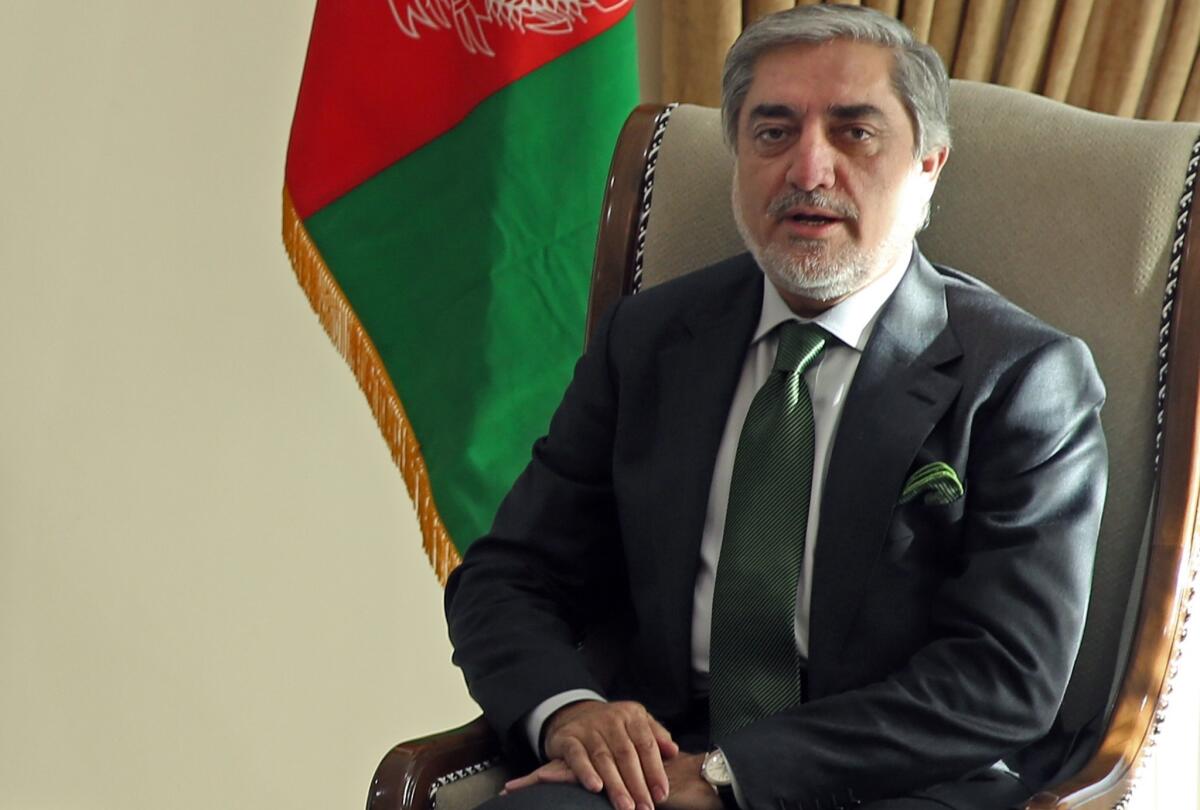Afghanistan reported close to direct peace talks with Taliban

- Share via
Reporting from Kabul, Afghanistan — The government of Afghanistan is close to beginning direct peace talks with Taliban insurgents for the first time, according to senior Afghan officials.
Abdullah Abdullah, chief executive in Afghanistan’s unity government, said at a Cabinet meeting Monday that Taliban leaders were willing to negotiate directly with Kabul, raising hope for a settlement to hostilities that began after the Sept. 11, 2001, attacks on the United States.
Abdullah said he had received assurances from Pakistan, where senior Taliban leaders are based, that the insurgent group was ready to hold face-to-face talks for the first time since a multinational diplomatic effort to engage the Taliban collapsed in 2013. The difference this time, officials say, is the peace process would be directed completely by Afghans.
“Pakistan has told those people that are involved in the war that they do not have any other option than negotiating with Afghanistan’s government,” Abdullah said.
With the U.S.-led NATO coalition having declared its combat mission over -– although about 10,000 American troops remain in Afghanistan -- new Afghan President Ashraf Ghani has sought to take ownership of the talks. Ghani has urged Pakistan in a series of meetings to put pressure on the Taliban and enlisted the support of China, a key ally of Islamabad.
One Afghan official with knowledge of the negotiations described the involvement of China as a “big, important new development.”
Ghani, who enjoys a less adversarial relationship with the Taliban than his predecessor, Hamid Karzai, is said to be willing to allow certain vetted Taliban representatives to participate in amending the constitution and even taking up positions in the unity government.
A spokesman for Ghani, Ajmal Obaid Abidy, declined to confirm details of the nascent peace process, but said it “will be transparent and according to the will of the people.”
In 2013, the Taliban briefly opened a diplomatic office in the Persian Gulf sheikdom of Qatar after clandestine talks involving the United States and the European Union. Angry that Afghans had been excluded, Karzai refused to participate and roundly criticized the effort, which quickly fell apart.
Afghan and international officials say Ghani’s approach is bearing fruit.
An Afghan official who has been in contact with the Taliban delegation in Qatar but was not authorized to speak to the news media, said one option being considered was to name a former Taliban official to lead the High Peace Council, the Afghan government body that liaises with the insurgency. The top candidate is Motassim Agha Jan, a finance minister under the Taliban government that ruled Afghanistan in the late 1990s.
Motassim, the former chairman of the political committee of the Quetta Shura, the Taliban’s Pakistani-based top leadership, for years has called on the group to to engage in the political process.
U.S. officials are said to be opposed to appointing Motassim, but Afghan officials say his involvement could reassure the Taliban that the government is serious about negotiating an agreement.
The peace council, long seen as ineffective, has previously been led by former Afghan President Burhanuddin Rabbani and his son Salahuddin, who were closely allied with slain former militia commander Ahmad Shah Massoud, one of the top leaders of the Afghan jihad against Taliban rule.
Taliban officials in Doha, Qatar’s capital, “said they can’t support [Motassim] publicly, but they also will not stand in the way,” the Afghan official said.
Some Afghan officials warn that the government must proceed with caution. Asadullah Hamdam, former governor of the southern province of Uruzgan, said Ghani’s government must make sure leaders in all areas of the country support the peace initiative. He referred specifically to northern Afghanistan, home of Massoud and other militia commanders who fiercely opposed the Taliban.
“Leaders in the north must be accepting, otherwise we will end up once again with a peace council that will alienate rather than engage one side or the other,” Hamdam said.
Last week, the U.S. and Taliban denied published reports that their representatives were preparing to meet in Qatar. Washington has repeatedly denied any role in direct negotiations with the Taliban, and a spokesman for the insurgent group said such talks would not take place while “thousands of invaders” remained in Afghanistan.
The 10,000 U.S. troops in Afghanistan, who are conducting counter-terrorism operations and training Afghan forces, are due to depart by the end of 2016. But Defense Secretary Ashton Carter says he is considering delaying that withdrawal.
State Department spokeswoman Jen Psaki said last week that the U.S. was “committed to enabling progress on an Afghan-led and Afghan-owned reconciliation process which can lead to a stable and secure Afghanistan.”
The denials reflected the secrecy surrounding the negotiations as well as the unpredictability of the Taliban leadership. Some analysts warn that the group has grown increasingly fractured as U.S.-led attacks have decimated their ranks, raising questions about the durability of any peace agreement.
The Afghan official said a peace deal could still have an important impact on a battlefield that is composed of many armed groups jockeying for political power.
“Everyone calls themselves Taliban now,” the official said, “so if the Taliban join the peace talks it will expose these other groups and leaders. It will isolate them.”
Latifi is a special correspondent. Staff writer Shashank Bengali in Mumbai, India, contributed to this report.
More to Read
Sign up for Essential California
The most important California stories and recommendations in your inbox every morning.
You may occasionally receive promotional content from the Los Angeles Times.










